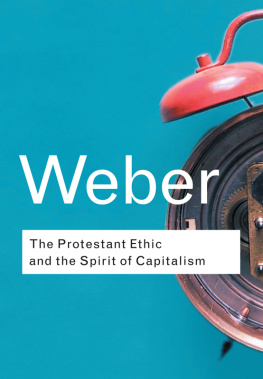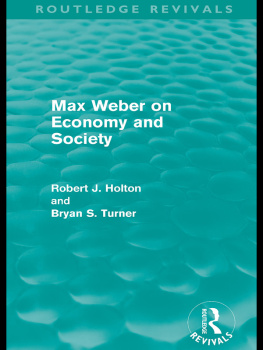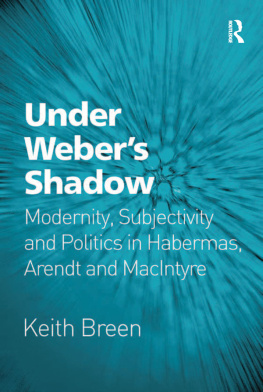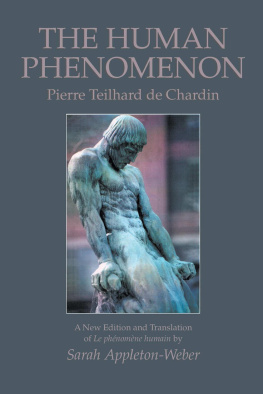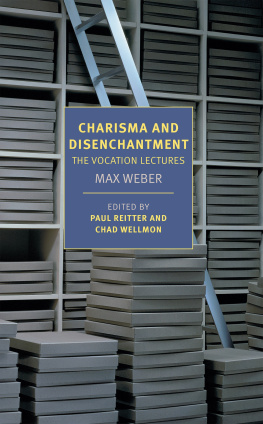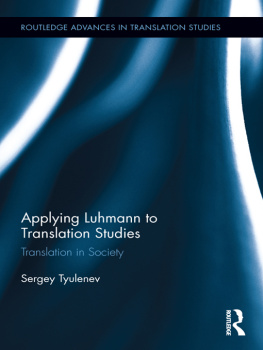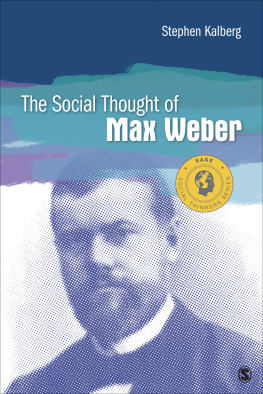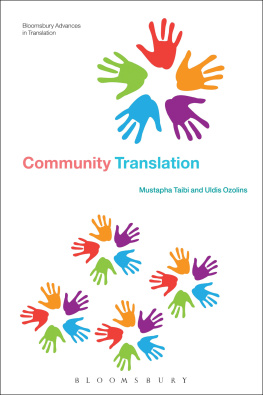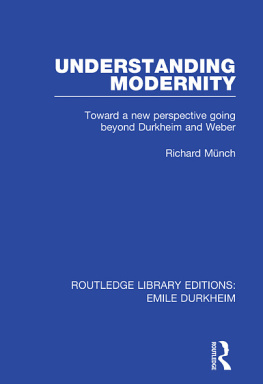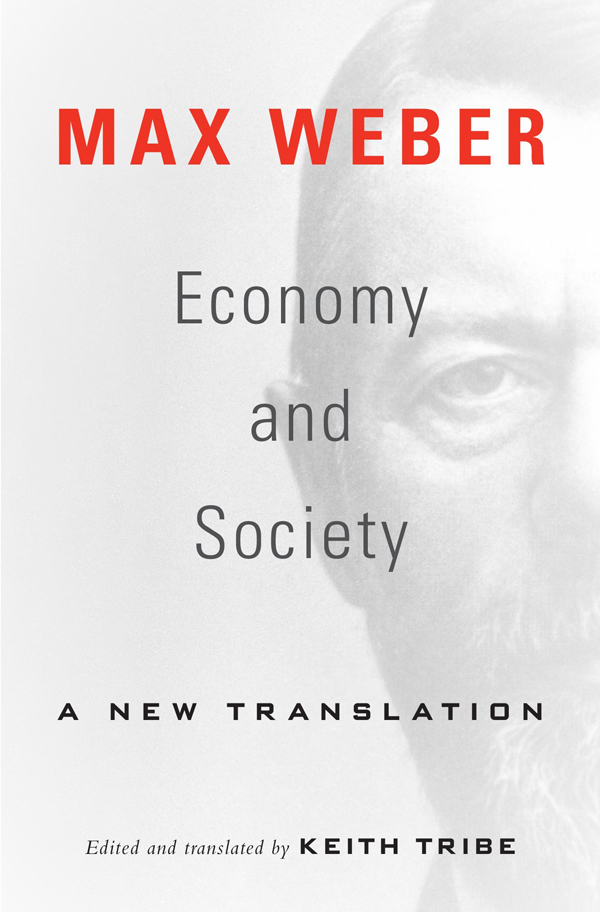978-0-674-91654-8 (alk. paper)
Names: Weber, Max, 18641920, author. | Tribe, Keith, editor, translator.
Title: Economy and society. I : a new translation / Max Weber ; edited and translated by Keith Tribe.
Other titles: Soziologische Kategorienlehre. English
Description: Cambridge, Massachusetts : Harvard University Press, 2019. | Includes bibliographical references and index.
Subjects: LCSH: Economics. | Sociology. | EconomicsSociological aspects.
Classification: LCC HB175 .W36413 2019 | DDC 306.3dc23 LC record available at https://lccn.loc.gov/2018030731
Max Weber was working on Economy and Society when he suddenly fell ill and died in June 1920. He had drafted and proofed the first three chapters and begun the fourth, which remained a fragment. He had not drafted any related material since 1913; resuming in 1919, he was now working to a new plan, but he left behind no notes or correspondence indicating what this plan was. Weber was conscious of the delays that dogged the project and had suggested to his publisher that Economy and Society should appear in instalments and then, once finished, be published as a complete book. In February 1921 the first instalment duly appeared, comprising the three completed chapters and a fragment of the fourth, that had been written in 19191920, typeset, the first three chapters having been proofed by Weber. It is the material in this February 1921 instalment, part I of the book we know today as Economy and Society, that is translated here.
Max Webers widow sought, however, to reconstruct the book as it had been planned in 1914. She therefore added earlier drafts to this new material; this appeared in three further instalments, the entire work being published for the first time in 1922. It is a version of this 1922 book that was published in English in 1968 under the title Economy and Society. An Outline of Interpretive Sociology, a work widely regarded as Max Webers final contribution to the social sciences of the twentieth century, and which did much to shape his later reputation as a comparative sociologist.
The first instalment had already been translated into English during the 1930s and was published in 1947 under the title The Theory of Social and Economic Organization, edited by Talcott Parsons. During the later 1940s, two other influential selections of Max Webers writings were published in English, positioning him as a sociological theorist whose work was a central point of reference for American sociology and political science during the 1950s and 1960sand in this guise was reimported into West Germany. This reputation was consolidated in 1964 with the republication of The Theory of Social and Economic Organization as a paperback, and also, more negatively, by a conference in Heidelberg marking the centenary of Webers birth at which both Herbert Marcuse and Jrgen Habermas criticized his contemporary standing in the postwar social sciences. During the 1970s, this critique of Webers work and its relationship to the American social sciences was reinforced by arguments that compared his analysis of capitalism, unfavourably, with that of Karl Marx. Not until the 1980s did more thorough scholarship begin to free Max Webers work of these tangled prejudices, so that today he is widely acknowledged once more as the leading theorist of modernitywhether this is conceived as a social, economic, political, or cultural phenomenon.
Economy and Society runs to over 1,500 pages in the English edition; the first instalment, referred to as part I in the 1968 edition, accounts for the first 300 pages. Given its mixed structurewith 80 percent of its content made up of material from older manuscripts, many of which bear no direct relationship to these first 300 pagesattention has tended to focus on the first and third chapters of part I: a presentation of basic sociological concepts and the use of these concepts in presenting a typology of political forms. As the subtitle of the 1968 English translation makes clear, Weber was then thought not only to be primarily a sociologist but to have in this book laid the foundations of an interpretive sociology. Both ideas can be shown to be misconceived, but today there is also greater interest in the analysis of political organisation presented in the third chapter. The second chapter, on social categories of economic action, in which Weber builds an analysis of economic institutions from social processes, has never attracted very much attention, in part because its style of economic argument was quickly displaced during the 1930s by the more formalised approach familiar today. Nonetheless, given the growing criticism of the kind of economics taught in colleges and universities today, this chapter provides a valuable perspective through which our understanding of economic activity might be reimagined.
Hence, the idea of publishing the first instalment as a separate volume has a great deal to be said for it, this being the only section of a book that Max Weber prepared for publication. In addition, this separate publication only existed in an English edition until the Max Weber Gesamtausgabe devoted Band (Bd.) I / 23 to it, with all the further manuscript material divided among the five separate parts of Band I / 22replicating in the volume order the actual chronological order of composition. Separate publication has much to be said for it as a way of clarifying Webers intentions. But the existing English translation also has many flaws that combine to obscure what exactly Max Weber was trying to do in 1919 and 1920. In presenting this new translation of that work, I hope to make Max Webers real intellectual achievements more accessible.
Nevertheless, this cannot be done by simplifying what is a densely argued text. Weber was a very fluent and compelling public speaker, but the rigour and consistency of his scholarly writing demand close attention. This new translation does not artificially smooth the path for a reader but is organised in a way that provides the reader with appropriate assistance. First, each chapter is prefaced with an overview of its structure and argument, so that the reader is able to make sense of how it develops. is in fact a revision of one of the older manuscripts incorporated into Economy and Society, but, especially in its closing pages, here Weber keeps referring the reader forwards to later material that he never wrote. This roughness in the text is not concealed here; nor where the text degenerates into lists is an effort made to smooth these into something more like a continuous narrative. Instead, the points where Weber refers the reader to material he never actually lived to write are footnoted and, where appropriate, explained. In addition, Webers lists are opened out visually by adding two additional levels of indentation, so that sections and subsections are more clearly distinguished.



